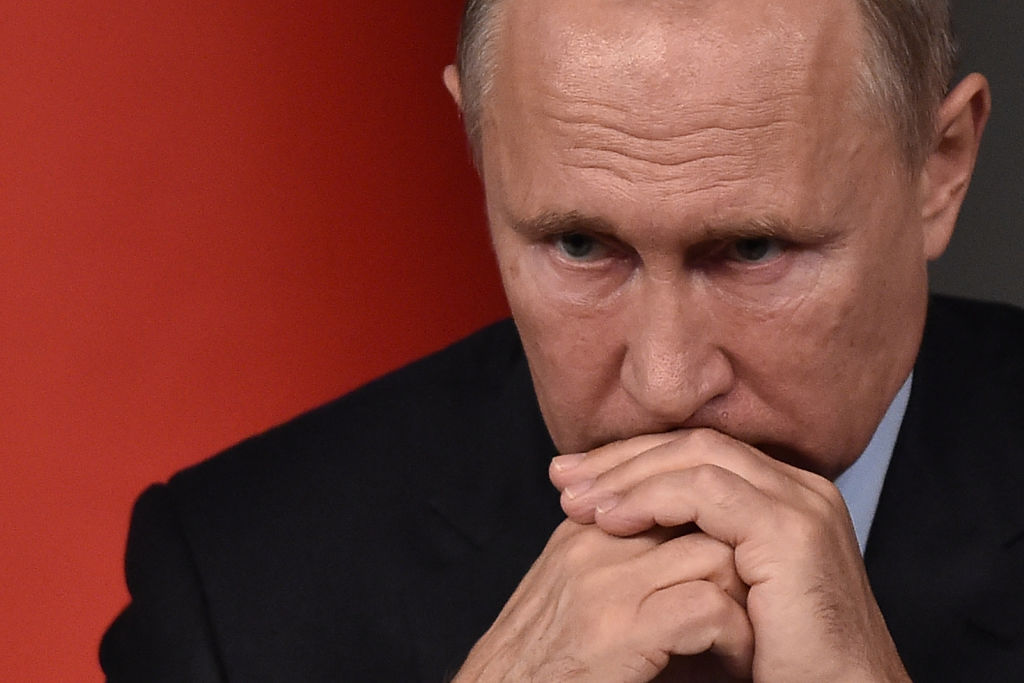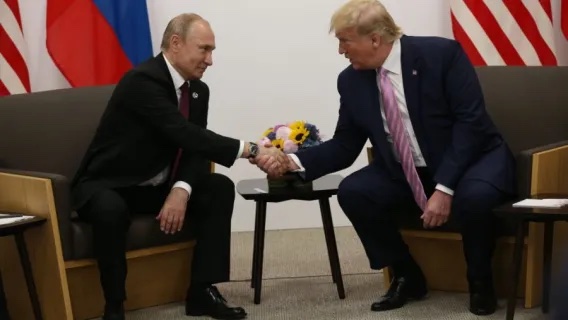The romantic plans of a Kazakh bodybuilder named Yuri Tolochko have become one more casualty of the coronavirus pandemic. He was going to marry his ‘fiancée’, Margo, a silicone sex doll, in March, but they both agreed on the need to delay. ‘My baby supported me on this. We are determined and our mood is good.’ His Instagram feed depicts their domestic idyll: a bald, muscle-bound man gazes adoringly at a pneumatic blonde who, it must be said, stares back somewhat blankly.
You might already know this if you get your news from Russian outlets like RT — Russia Today — or Sputnik. Their websites have an unerring eye for the human-interest stories that make for irresistible clickbait. And their treatment of regular news is attention- grabbing, clever and slick — this is not the old Radio Moscow, except of course that they both reliably follow the Kremlin line. They are cranking out their propaganda with increasing urgency in the run-up to the 2020 presidential election in the US.
They’re being carefully watched by the German Marshall Fund’s Hamilton Project, which is literally counting their stories. Alexander Hamilton wrote in Federalist 68 that the most deadly threats to the republic would come from meddling by foreign powers. At the Marshall Fund, they say that ‘today, we face foreign interference of a type Hamilton could scarcely have imagined’. Another monitoring project, by the Foreign Policy Research Institute, says that the main themes of the Russian media in English are the weakness of US democracy and the instability of American society.
Current events might support that narrative — the most effective propaganda contains an element of truth. But the Kremlin’s mouthpieces also lie easily (or at least bend the facts). Their favorite running story peddles the fiction that Russia did not interfere in the 2016 election. In a piece headlined ‘Six big lies you have been told about Russiagate’, RT says there’s ‘zero proof’ of Russian hacking and leaking of Democratic party emails.
So it’s worth reading exactly what Special Counsel Robert Mueller had to say about Russia’s actions in the last presidential campaign. His report identifies Unit 26165 of Russian military intelligence, the GRU, which it says hacked into the Democratic party’s servers and stole emails and other documents. Mueller describes how Unit 26165 infected computers with a hacking tool called X-Agent, able to log keystrokes and take screenshots. Malware called Mimikatz was used to steal usernames and passwords.
The first intrusion came on April 11, 2016. Days later, GRU officers were freely roaming around the Democratic party’s computers, searching for documents that had the words ‘Hillary’, ‘DNC’, ‘Cruz’ or ‘Trump’. Unit 74455 of the GRU was responsible for leaking the stolen material. It used a fake website, DCLeaks, and a fake online persona, Guccifer 2.0. Guccifer 2.0 emailed journalists some of what it found before finally dumping everything through WikiLeaks. Detail by detail, Mueller builds up an utterly convincing picture of what happened. By repeatedly denying his account, RT and Sputnik hope to confuse American voters about what Russia did in 2016. This matters a great deal if the Kremlin is doing it again in 2020.
RT and Sputnik don’t have big audiences in the US, but their stories are picked up and repeated on Twitter and Facebook. The Internet Research Agency — identified by Mueller as a Kremlin front organization — bought ads on Facebook in 2016, but only 3,500 of them, costing $160,000 according to one account. Jared Kushner, who was effectively running the Trump campaign much of the time, scoffed at that. ‘They said they spent $160,000. I spent $160,000 on Facebook in three hours.’ But paid ads and reposted news stories — however dubious — were only a small part of how voters were influenced on Facebook before they voted. A BuzzFeed analysis conducted after the election found that in the last three months of the campaign more invented stories were shared in Facebook newsfeeds than real stories. This is fake news in the literal sense, not the way President Trump uses the term to attack stories he doesn’t like.
In the last, critical months of the 2016 campaign, according to the BuzzFeed analysis, 20 of the most popular fake stories from hoax websites had 8,711,000 shares, likes and comments on Facebook. That compares with 7,367,000 for the 20 top stories from major news outlets. This is the power of clickbait to go viral, whether or not it’s true. The single top Facebook story for the New York Times got some 370,000 engagements. To be fair, the Gray Lady isn’t best suited to competing in the cutthroat world of Facebook clickbait. It was outdone among mainstream news organizations, for instance by the New York Post, which got 531,000 shares, likes or comments for its (true) story ‘Melania Trump’s girl-on-girl photos from racy shoot revealed’. But the single best performing fake news story got 960,000 people to repost it or comment. This was ‘Pope Francis shocks world, endorses Donald Trump for president’. The number-two fake was ‘WikiLeaks confirms Hillary sold weapons to Isis’ (789,000). There was also ‘FBI agent suspected in Hillary email leaks found dead in apparent murder-suicide’ (567,000) — a handy story if you’re trying to cover your hackers’ tracks.
Mike Pence and Mike Pompeo — the grown-ups in the Trump administration — have said that Russian actions made no difference to the result of the 2016 election. They stressed that this wasn’t just their opinion but the judgment of the US intelligence community. In fact, the report they referred to said, on behalf of the CIA, the NSA and the FBI: ‘We did not make an assessment of the impact that Russian activities had on the outcome of the 2016 election.’ Perhaps fake news was ignored by most Americans, the stories shared by an active but tiny minority of Facebook and Twitter users. Or perhaps it made the crucial difference in the three swing states that turned on 78,000 votes. We just don’t know.
What if Russian hacking changed the tally of votes? This allegation has been revived by the former Democratic majority leader in the Senate, Harry Reid. He spoke to the author of a new book on election-rigging and said there was ‘no question’ that Russia had altered the vote totals. ‘I think one reason the elections weren’t what they should have been was because the Russians manipulated the votes. It’s that simple.’ On the face of it, Mueller found some worrying facts that fit with this. His report says that the GRU hacked into state elections boards and used malicious code to download the voter rolls. However, this might have been to get data to ‘microtarget’ political ads on social media. Or — as The Spectator reported recently — to steal identities to make campaign donations in the names of real Americans.
Mueller also says that the GRU ‘targeted private technology firms responsible for…electronic polling stations’. Did this targeting work? Mueller doesn’t know. The Senate Intelligence Committee found no evidence that any votes were changed, though their report also said that the US intelligence agencies had ‘limited’ insight into what was happening at state level. ‘Russian government-affiliated cyber actors conducted an unprecedented level of activity against state election infrastructure in the run-up to the 2016 elections.’
One former western intelligence officer told me he had fostered a Russian source who claimed that the GRU knew how to hack into voting machines and would change real votes in 2020. But perhaps this is what the Kremlin wants us to believe. That’s the opinion of Nina Jankowicz, an expert at Washington’s Wilson Center in Washington. As one election official told her, when it comes to electoral systems, the Russians ‘don’t open the door, they just rattle the handle, to let us know they’re there’. She thinks that Russian state hackers might engage in some ‘cyber caper’ to create mischief in one state or a single precinct. Votes wouldn’t have to be changed: just the attempt might be enough to cast doubt over results across the country.
***
A print and digital subscription to The Spectator is just $7.99 a month
***
Jankowicz is the author of a new book, How to Lose the Information War: Russia, Fake News, and the Future of Conflict. She worries that it’s already too late to do much about the 2020 election. The Kremlin’s objective wasn’t to back one party over another or even to get sanctions lifted or promote trade deals with Russia, but to consolidate a lack of trust in the system. That goal had already been achieved because of the many people who thought the 2016 election had been hacked, and that Donald Trump was put in the White House by a hostile foreign power. Jankowicz wants both major parties to say clearly that they are against Russian interference, whoever might gain from it. ‘This is a threat to democracy and Americans should be mad about it.’
In 2016, Mueller and the US intelligence agencies thought Russia had intervened to get Trump elected. They found that he hadn’t colluded in this but that his campaign was, nevertheless, eager to accept the help. It’s quite possible that, like everyone else, Vladimir Putin thought Hillary Clinton would win and was backing Trump to cause trouble. He might not really have believed that, as Hamilton put it, a foreign power could raise ‘a creature of their own to the chief magistracy of the Union’. This time around, intelligence agencies don’t think that Russia is supporting a particular candidate but that it wants simply to demoralize the American electorate. (That’s the most recent assessment, given to Congress in March in a closed session and leaked to the US media.)
It’s not possible to stop the flow of fake news. The authorities in Ukraine have just closed down a Russian bot farm, seizing 40,000 SIM cards and other equipment. There will be others. Fake news can be, and is, fact-checked by proper news organizations that, whatever their biases, apply some rigor in their reporting. But this is of limited use. Fake news surrounds us on social media like a swarm of flies. One story gets swatted away; there are always more. It’s all too easy to hear something interesting and pass it on without really asking where it came from. The effects of this natural human tendency are frighteningly powerful when multiplied across Facebook and Twitter — especially when exploited by a malign actor like Putin’s Russia. As the conspiracy theorist Alex Jones says, there’s a war going on ‘for your mind’. In this presidential election, if you click on a link, caveat lector.
This article is in The Spectator’s August 2020 US edition.

























